home
CROP CIRCLE ARTICLES
IMAGERY CROP CIRCLES
Mixon, Etchilhampton, august 10 2018.
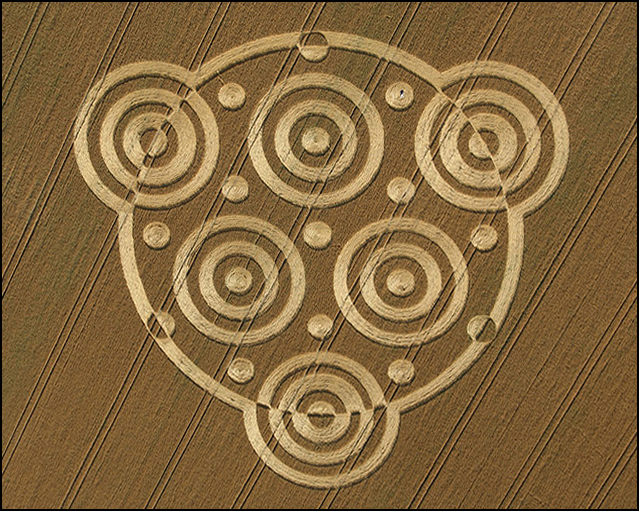
Mixon, Etchilhampton 2018 8 10, Wiltshire U.K. © Lucy Pringle.
Connecting the Dots
This very successful crop formation is associated with the head of a little monkey or bear. As far as
I'm concerned, these are associations for the trash bin. During my long contemplations on this design,
I came to call it the "connecting the dots" formation. I will explain why.
I started studying the formation based on both its popularity in my circle of friends and my fascination for what I would call a design category. Aspects that may characterize this category concern the application of concentric circles and reversals within the light/dark pattern.
Examples of formations from the category:

2007 Morgan Hill, 2010 Beggar's Knoll, 2014 Ammersee.
The category can be extended in different directions by adding again other aspects.
As for the Etchilhampton formation; driven by Patanjali's royal yoga (Raja Yoga) I started to focus on
the dot or point in the middle. In essence, this dot is not exceptional to all other dots in the design,
besides that it is placed in the middle.
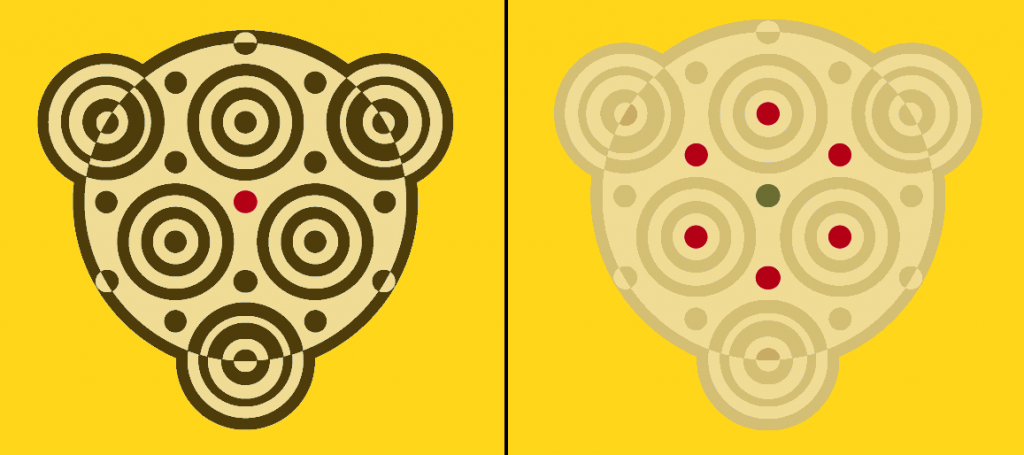
Left: Focal Point. Right: Six equidistant placed dots.
In accordance with a natural development of creation, we see six dots neatly spaced equidistant around
the central dot. It is noteworthy that three of these dots have an extension with concentric rings. The
question it raises for me is why the central dot has not been extended since it can be considered as the
first cause, as a source?
So we see that the three points have, as it were, been further developed or grown by the expansion with
rings. Depending on how you want to look at it, either two or four rings. It implies that they, by means
of their nature, demand a lot of attention. You could call them dominating points. It evokes in me
associations such as everything you give attention tends to grow by itself.
The expansion or growth of the three points means that apparently the adjacent points can no longer
expand. There seems to be no place left for it, unless border crossings take place. Notice however,
in the extreme regions of the formation, there actually are border crossings...
To continue, I think it would be an interesting step to examine what the formation would have looked
like if the points had all been extended equally. I leave the outside thereby untouched for a moment.
Another alternative arises if we assign four rings (two light plus two dark) to the core and apply the
most obvious extensions from there. Also here, I leave the outside unchanged for the time being.
Alternatives.
As far as I'm concerned, both alternative representations look more harmonious than the original. This
simple exploration has also emphasized the difference between in and out.
The boundary between inside and outside, or the inner and the outer, is formed by the use of a contrast.
Everything that is inside and moves across this circular boundary turns into the opposite shade. What is
light inside becomes dark outside and vice versa.
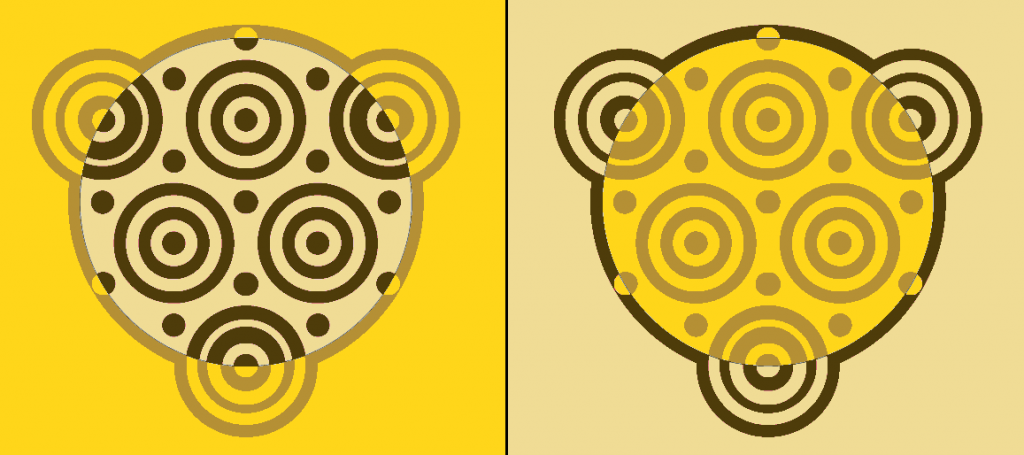
Left: Inside. Right: Outside.
On close examination, this reversal stuff turns out not to be entirely true, but at least apparently is
the case. One may wonder whether the expanding rings on the border of inside and outside are deliberately
created in such a way that there are variations in their line thickness or whether this phenomenon has
to do with an error in the construction of the design. The variations are in all three expanding dots in
accordance with what leads me to suspect that this is a conscious choice. It is strange since the three
inner expanding dots have neat concentric rings of the same line thickness. From this point of view, a
continuation of this method of construction would be logical and not difficult. Yet this does not happen.
Different sizes.
The above observation feeds me with the thought that it will be in the nature of the border crossings that
the complications occur. As if a referee is needed.
After having detected four expansion rings you could even speak of an indomplete fifth expansion ring. It
seems not to be able to continue inwards due to lack of space, although that is questionable. If it cannot
be understood as an expanding ring, then it concerns the boundary of the formation as a whole. In addition,
it is remarkable that the standard line thickness has again been chosen as is the case with the most inner
expanding rings. In this way, it could refer to an all-encompassing expansion...
The boundary of the formation as a whole.
To come back to the idea that everything that gets attention will grow by itself, I want to dwell on the
dots that have not expanded. I have come to associate with the societal phenomenon of censorship and
suppression of criticisms, by the dominant government and mainstream media forces and narrative that is
artificially made big and leaves no room for reasonable alternative points of interest. See here why I
have come to call the formation the "connecting the dots" formation.
It leads no doubt that a leap from abstract geometric shapes to an interpretation with regard to government
narrative goes quite far. Nevertheless, I give it a chance where I want to be careful not to get bogged
down in all kinds of politically charged opinions, so that I don't have to talk about elbowing out. If a
convincing metaphysical explanation were possible, it seems to me that it's in any case about points of
attention that limit or displace each other's expansion. Some issues get more attention than others.
Something to do with priorities so to speak.
The thought of crowding points of attention indicates that there may be a very universal package of
information. Actually, like so many crop formations, the crop formation offers an engaging exercise in
cognitive ability. For example, with the representation of an inner and an outer, we can also easily
perceive a psychological dimension. The idea of crossing borders can possibly lead to moral reflections.
In that case, it concerns how light and dark, understood as right and wrong, get reversed.
To stay in psychological spheres, it is worth reporting that the concentric light/dark alternations feel
kind of hypnotic. In that respect, the earlier mentioned category can effortlessly be expanded with other
hypnotic-looking crop circles.
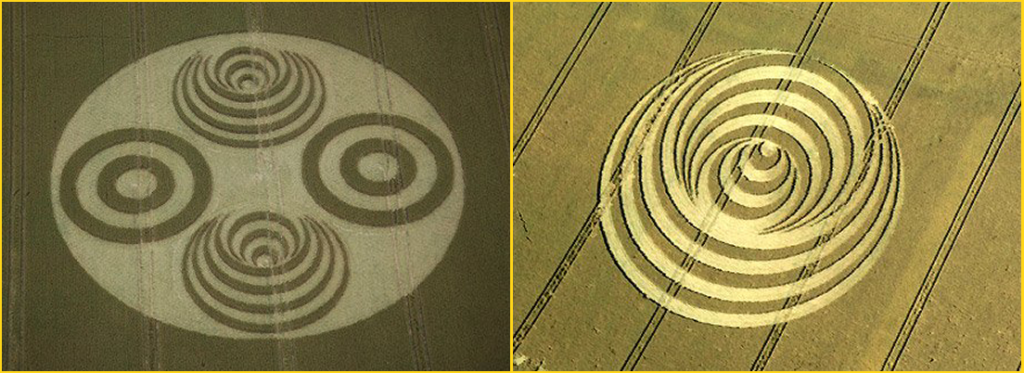
Left: 2006, Savernake Forest. Right: 2006, Altbourne.
It is not uncommon for people under hypnosis or through the influence of mind-altering drugs to have
declared been travelling through a tunnel of concentric black-and-white rings. This experience can be
accompanied by a realization that one is outside the dimension of time. The rings can be experienced as
an alternation of life and death, as if one were flying past one's own series of incarnations. Incidentally,
the writer himself once experienced this during an impressive out of body adventure.
Tunnel
On the basis of these or similar black and white patterns, one can thus experience regions of consciousness
that far exceed everyday reality.
An aspect in the contemplation of the Etchilhampton seal that has not yet been highlighted concerns the
three split dots where no expansion is depicted. You could say that due to the location of the three more
central located expanding dots, expansion is not possible here. At the same time, we have to conclude that
three other split dots do not care much about such a spatial limitation, since they do penetrate the
overall outer edge.
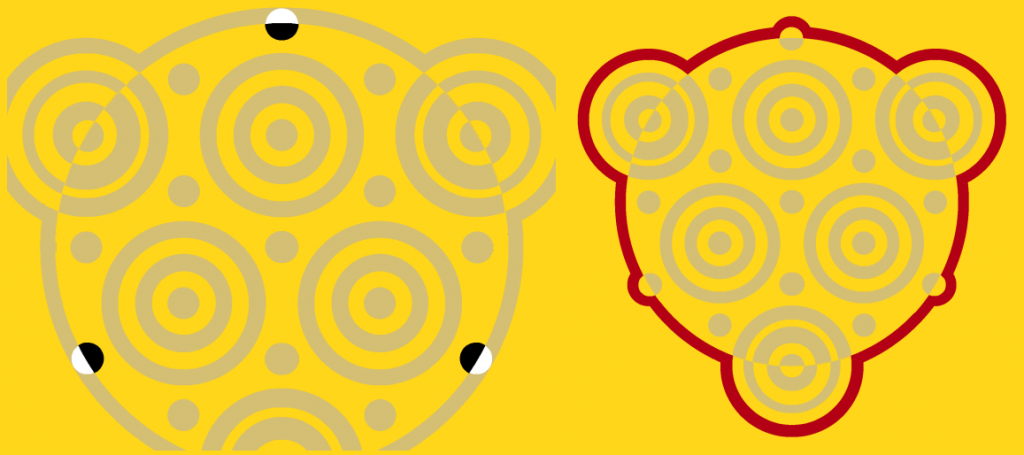
L: 3 split dots without expansion. R: Expected edge.
Despite the fact that the three dots penetrate the outer edge, it is not the case that they expand. Given
the other three split dots do expand, one would expect the same. However, the outer edge does not form to
these three, say, "modest" dots. It is as if the earlier mentioned all-encompassing expansion does not
include, does not yet include, or barely includes these "modest" dots.
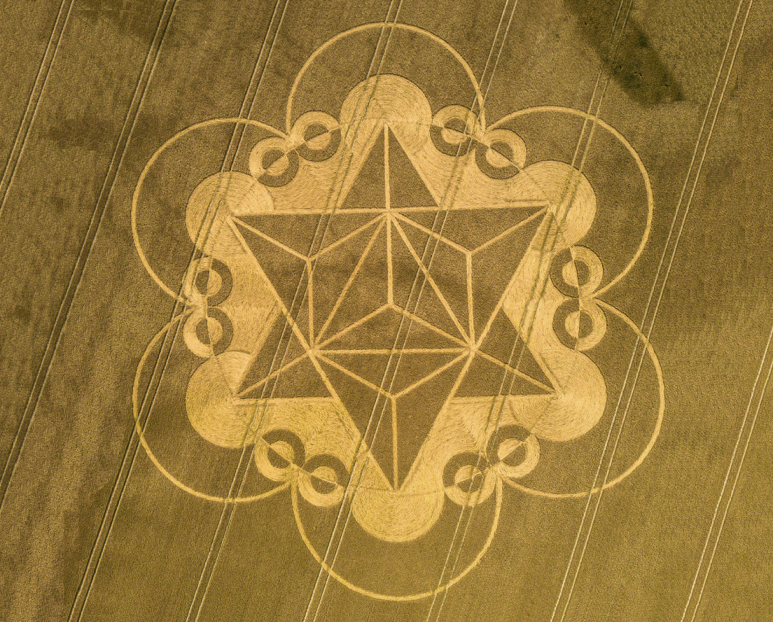
Cley Hill, 2017. © Cropcircleconnector.
The split dots remind me of quantum mechanical data points, as I wrote about them in an article about the
Cley Hill formation of 2017. In short, data points are symbolized by typical selector switches as used in
digital surveys or order forms. The split selector switches or data points indicate, according to the
nature of quantum possibilities, existence, non-existence and both existence and non-existence at the same
time. The split selector thus represents a quantum mechanical data point. From this point of view, the
formation as a whole could perhaps be interpreted as the representation of a qubit?

Left: Quantum mechanical datapoints. Right: Traditional and quantum datapoints.
It turns out that traditional data points can also be found in the formation. They can be found within
the unbundled expansions. It again raises the question of what the unexpanded points represent.
The discovery of data points in the formation apparently complements the attention to hypnosis or cycles
of life and death with attention to computer science. In this way, as far as I am concerned, the
computer-regulated (technocratic) government narrative and the displacement of critical points of
interest are once again, this time more prominent, eligible for consideration.
Probably the meaning goes far beyond the treatment of a certain government narrative. One can think
of the registration of everything. A technocratic Utopia in which all of reality, all that exists,
is recorded by nanotechnology and virtually incorporated. In other words; in that case, all of nature
is subordinated to computer algorithms, programs to which holy, far above God-superior technicians put
their own spin.
In summary, it seems to me that the Etchilhampton formation is essentially about options and
impossibilities. Choices that may or may not be made by an artificial entity versus choices that are
available in the nature of consciousness. The existence or non-existence of freedom of choice has
thus been raised. It probably exists and doesn't exist at the same time...
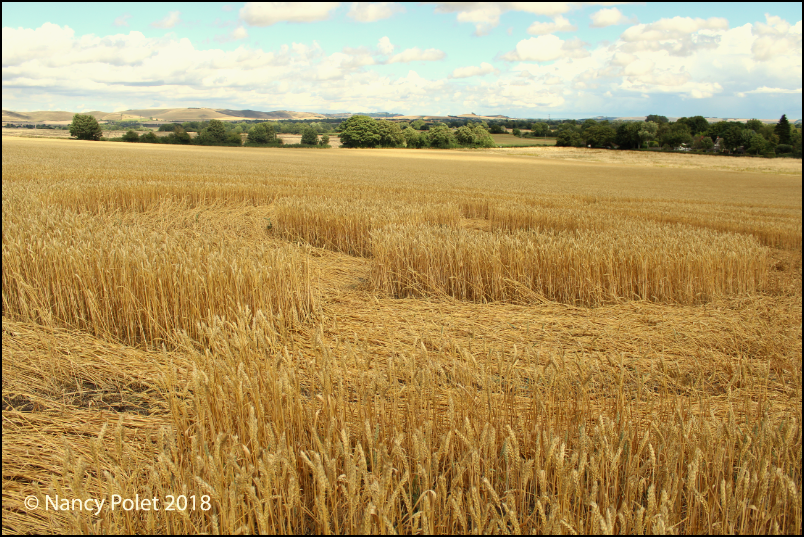
Inside the Etchilhampton crop circle. © Nancy Polet.
After having detected four expansion rings you could even speak of an indomplete fifth expansion ring. It seems not to be able to continue inwards due to lack of space, although that is questionable. If it cannot be understood as an expanding ring, then it concerns the boundary of the formation as a whole. In addition, it is remarkable that the standard line thickness has again been chosen as is the case with the most inner expanding rings. In this way, it could refer to an all-encompassing expansion...
It leads no doubt that a leap from abstract geometric shapes to an interpretation with regard to government narrative goes quite far. Nevertheless, I give it a chance where I want to be careful not to get bogged down in all kinds of politically charged opinions, so that I don't have to talk about elbowing out. If a convincing metaphysical explanation were possible, it seems to me that it's in any case about points of attention that limit or displace each other's expansion. Some issues get more attention than others. Something to do with priorities so to speak.
The thought of crowding points of attention indicates that there may be a very universal package of information. Actually, like so many crop formations, the crop formation offers an engaging exercise in cognitive ability. For example, with the representation of an inner and an outer, we can also easily perceive a psychological dimension. The idea of crossing borders can possibly lead to moral reflections. In that case, it concerns how light and dark, understood as right and wrong, get reversed.
To stay in psychological spheres, it is worth reporting that the concentric light/dark alternations feel kind of hypnotic. In that respect, the earlier mentioned category can effortlessly be expanded with other hypnotic-looking crop circles.

Left: 2006, Savernake Forest. Right: 2006, Altbourne.
An aspect in the contemplation of the Etchilhampton seal that has not yet been highlighted concerns the three split dots where no expansion is depicted. You could say that due to the location of the three more central located expanding dots, expansion is not possible here. At the same time, we have to conclude that three other split dots do not care much about such a spatial limitation, since they do penetrate the overall outer edge.

L: 3 split dots without expansion. R: Expected edge.

Cley Hill, 2017. © Cropcircleconnector.

Left: Quantum mechanical datapoints. Right: Traditional and quantum datapoints.
The discovery of data points in the formation apparently complements the attention to hypnosis or cycles of life and death with attention to computer science. In this way, as far as I am concerned, the computer-regulated (technocratic) government narrative and the displacement of critical points of interest are once again, this time more prominent, eligible for consideration.
Probably the meaning goes far beyond the treatment of a certain government narrative. One can think of the registration of everything. A technocratic Utopia in which all of reality, all that exists, is recorded by nanotechnology and virtually incorporated. In other words; in that case, all of nature is subordinated to computer algorithms, programs to which holy, far above God-superior technicians put their own spin.
In summary, it seems to me that the Etchilhampton formation is essentially about options and impossibilities. Choices that may or may not be made by an artificial entity versus choices that are available in the nature of consciousness. The existence or non-existence of freedom of choice has thus been raised. It probably exists and doesn't exist at the same time...

Inside the Etchilhampton crop circle. © Nancy Polet.







